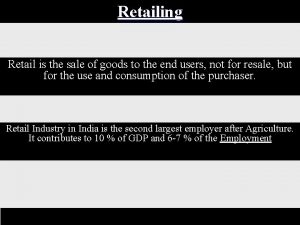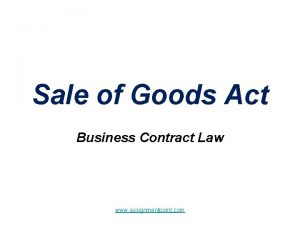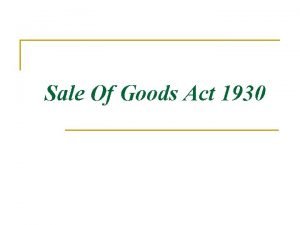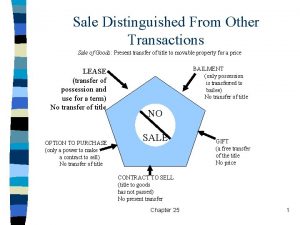LAW OF SALE OF GOODS CONTRACT OF SALE







- Slides: 7

LAW OF SALE OF GOODS

CONTRACT OF SALE OF GOODS

n CONTRACT OF SALE Ø Section 4 of the sale of Goods Act, “A contract of sale of goods is a contract whereby the seller transfers or agrees to transfer the property in goods to a buyer for a price. ” Ø This Act may be called the Sale of Goods Act, 1930. Ø It extends to the whole of India [except the State of Jammu and Kashmir]. Ø It shall come into force on the lst day of July, 1930.

n SALE AND AGREEMENT TO SELL Ø A contract of sale of goods is a contract whereby the seller transfers or agrees to transfer the property in goods to the buyer for a price. There may be a contract of sale between one part-owner and another. Ø A contract of sale may be Ø 1. ) Sale or absolute sale: Where under a contract of sale the property in the goods is transferred from the seller to the buyer, the contract is called a sale. Ø 2. ) Agreement to sale or conditional sale: Where the transfer of the property in the goods is to take place at a future time or subject to some condition thereafter to be fulfilled, the contract is called an agreement to sell. • How agreement to sell becomes a sale? Ø An agreement to sell becomes a sale when the time elapses or the conditions are fulfilled subject to which the property in the goods is to be transferred.

n ESSENTIALS OF A CONTRACT OF SALE Ø Ø A valid contract. Two parties. Agreement for transfer of ownership. Goods are the subject matter. Price is the consideration. • HOW CONTRACT OF SALE IS MADE? Ø A contract of sale is made by an offer to buy or sell goods for a price and the acceptance of such offer. The contract may provide for the immediate delivery of the goods or immediate payment of the price of both, or for the delivery or payment by instalments, or that the delivery or payment or both shall be postponed. Ø Subject to the provisions of any law for the time being in force, a contract of sale may be made in writing or by word of mouth, or partly in writing and partly by word of mouth or may be implied from the conduct of the parties. Ø Ø Ø

n SUBJECT MATTER OF CONTRACT Ø EXISTING OR FUTURE GOODS The goods which form the subject of a contract of sale may be either existing goods, owned or possessed by the seller, or future goods. There may be a contract for the sale of goods the acquisition of which by the seller depends upon a contingency which may or may not happen. Where by a contract of sale the seller purports to effect a present sale of future goods, the contract operates as an agreement to sell the goods. Ø GOODS PERISHING BEFORE MAKING OF CONTRACT Where there is a contract for the sale of specific goods, the contract is void if the goods without the knowledge of the seller have, at the time when the contract was made, perished or become so damaged as no longer to answer to their description in the contract. Ø GOODS PERISHING BEFORE SALE BUT AFTER AGREEMENT TO SELL Where there is an agreement to sell specific goods, and subsequently the goods without any fault on the part of the seller or buyer perish or become so damaged as no longer to answer to their description in the agreement before the risk passes to the buyer, the agreement is thereby avoided.

n THE PRICE n ASCERTAINMENT OF PRICE The price in a contract of sale may be fixed by the contract or may be left to be fixed in manner thereby agreed or may be determined by the course of dealing between the parties. Where the price is not determined in accordance with the foregoing provisions, the buyer shall pay the seller a reasonable price. What is a reasonable price is a question of fact dependent on the circumstances of each particular case. n AGREEMENT TO SELL AT VALUATION Where there is an agreement to sell goods on the terms that the price is to be fixed by the valuation of a third party and such third party cannot or does not make such valuation, the agreement is thereby avoided; provided that, if the goods or any part thereof have been delivered to, and appropriated by, the buyer, he shall pay a reasonable price therefor. Where such third party is prevented from making the valuation by the fault of the seller or buyer, the party not in fault may maintain a suit for damages against the party in fault. n Ø Ø MODE OF PAYMENT OF PRICE By cheque By bank guarantee By letter of credit By any other mode












